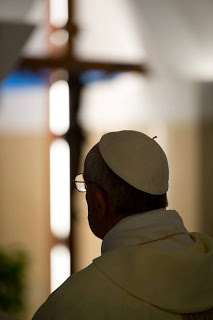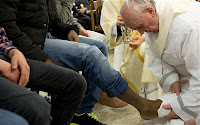In a talk right out of Scripture ("I came to bring not (superficial) peace but a sword!") Francis has given the youth of the Church their commission (marching orders!) as disciples of Christ. It is a stunning call to action and sure to capture the hearts and minds of young Catholics (and recapture those of many of us older ones as well!). For those suggesting Vatican II did nothing new, involved no break with certain dimensions of the old, was merely continuous with Tradition, listen to this report on a relatively spontaneous talk by Francis; it is a reflection of Vatican II and an interpretation of the Council's teaching which involved discontinuity as well as continuity. "Make a mess!" "Disturb complacency!" "Shake up clericalism" "Take the Church to the streets" and open up the windows of a church "closed in on herself!" This is the SPIRIT OF VATICAN II so much maligned and denigrated over the last 35 plus years. And here it is, alive and well in the Bishop of Rome!!
“What do I hope for from World Youth Day? I hope for a mess ... that the Church takes to the streets. That we defend ourselves from comfort, that we defend ourselves from clericalism,” the Pope told a group of pilgrims from Argentina during this week's World Youth Day. “The Church must be taken into the streets,” he said in the cathedral of Rio de Janeiro July 25.
Pope Francis' meeting with the youth of Argentina was not originally planned, and forced a rearrangement of his schedule. The encounter was not announced until Tuesday, when the Pope was already in Brazil. At least 35,000 Argentines flocked to the cathedral to see their Pope. “Thank you to those who are inside, and to the 30,000 who are out there: I greet all of you from here, you who are standing in the rain,” he said. “Thank you for your gesture of being close to us, of being with me here at World Youth Day.”
“I asked my organizers if there was a moment this trip at which I can meet with my fellow Argentines, please find it.” He indicated that the meeting was a result of his own “personal request.” Pope Francis told them his hopes for the event, and stressed that the Church, that the life of parishes, must be taken into the streets. “If not, the Church becomes an NGO. And the Church cannot be an NGO,” he said, echoing his very first Mass as Bishop of Rome, in which he preached to the cardinal electors that “if we do not profess Jesus Christ … we may become a charitable NGO, but not the Church, the Bride of the Lord.”
Pope Francis said that the world “has made a cult, a god, of money. We are before a philosophy that exults material goods,” and that this striving for comfort and following the mundane must not seep into the Church. This philosophy, he reflected, “excludes” the youth and the elderly. “We do not let aged people speak, and as for young people – it is the same. They do not have the experience and the dignity of work … Young people must be able to go out and fight for their values,” he urged. “Care for the two extremes of life,” he taught. As youth must be able to stand up for their values, so must “older people be able to speak out, to transmit their wisdom and knowledge.”
“You must not let yourselves be marginalized. Faith in Christ is not a joke. The only sure way, is the way of Jesus, the resurrection of Jesus.” “Faith in God's Son, who became man and who died for me, must make a mess, must disturb us out of our complacency.” “This is your protocol for action: the Beatitudes and Matthew 25,” he advised the youth. Matthew 25 tells of the separation of the sheep from the goats at the Last Judgement: “I was hungry, and you gave me to eat; I was thirsty, and you gave me to drink; I was a stranger, and you took me in.”
“Please, do not water down the faith,” he pleaded. “Stir things up, cause confounding, but do not diminish faith in Jesus Christ.” Finally, Pope Francis thanked his countrymen for their closeness to him. He lamented that he could not be closer to them. “At times I feel (encaged) … how ugly it is to be encaged, I would have liked to be closer to you all,” he said, sharing his heart with them.
“Don't forget to make a mess, to disturb complacency. Don't forget the youth and the aged.” The Pope concluded by blessing the crowd, as well as a Franciscan cross and an image of Our Lady of Lujan, Argentina's patroness, which will be returning with the youths to their country. “The Lord left his mother among us to accompany us. She cares for all of us, protects us on our way, in our heart, in our faith. May we be disciples, just as she was, and missionaries, also like her.” Pope Francis asked God's mother to give voice “to the scandal of the cross …. which speaks of the closeness of God.”
“May God bless you all,” he said, leaving his compatriots. “Pray for me. Do not forget to pray for me.”






.jpg)






































